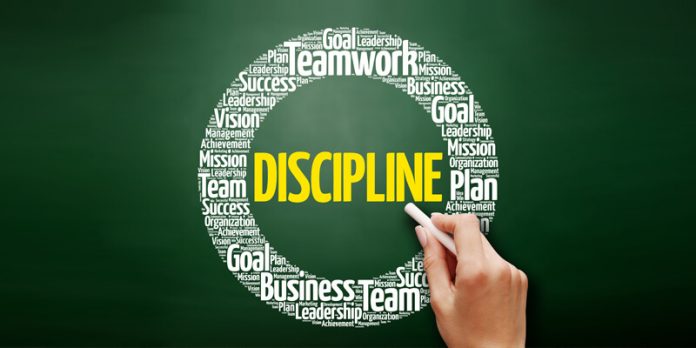This article is written by Ramanuj Mukherjee.
“The first and best victory is to conquer self.” – Plato
I suffer from a terrible lack of discipline. I have very little self-control. I can focus on very few (like one or two at most) things at a time, but my mind is drawn to a thousand possibilities and interests at once. I am prone to daydreaming – as my mind wanders off to deep thoughts about how certain things can play out, or how I can achieve a certain goal.
I know people who are naturally disciplined. I have an uncle who wakes up at the exact same time every day – 5.10 am in the morning. Then he does everything by the clock. He feels hungry at the same time every day. He does even his shaving by the clock. He writes poetry, and he sits down to write his poems once a week as per his schedule.
I envy such personalities. And hoped I would learn to be as disciplined someday. Life will be so good. Success will be inevitable.
I finally accepted, after being berated for my indiscipline through my teenage and later beating myself up over this throughout college, at some point in my adulthood, after starting my own startup, that I am not going to change.
No matter how many task lists and routine charts or perfect plans for the day I made, or how many motivational videos I watched, I never managed to stick to my plans for long.
I do not have discipline. So my growth can not depend on it. I had to find an alternative.
I grew up hearing a lot about how my lack of self-discipline is terrible and how it will destroy me. And that definitely looks like a possibility. Disciplining the mind has been always a challenge, so I decided to study it, and find pathways to success that suit my nature and does not involve such strict discipline.
And over time I learned that not being so disciplined does not have to prevent me from achieving big goals, as long as I stick to some basics.
Would you like to learn what I found?
We often misunderstand discipline as an ingredient for success
Success requires consistency, and not necessary altering your mind or nature altogether. If you look at 16 character archetypes created by Carl Jung, you will realize that there are personality types for whom discipline comes naturally, while for others it is highly unnatural.
There are personality types who have other strengths, such as imagination and creativity, or maybe an ability to effortlessly connect with or lead other people. For instance, I am an ENTJ. People in this category (only 2% of the general population, approximately) are hyper-competitive achievers, but they are prone to procrastination as they try to control many things at a time, chase multiple goals and fail to prioritize.
ISTP, ESTP, ESFJ and ISFJs find discipline boring, suffocating and prefer to live in the moment.
INFJ, INFP, and ENFJs, on the other hand, tend to have natural instincts that support disciplined and regimented life as opposed to the character types described above.
Through my own experience of self-management as well as after guiding many of my students and colleagues, I have come to believe that discipline cannot mean the same thing to everyone.
Some people are able to achieve moral, emotional, and idealistic discipline, which is also important for success. These same people can struggle quite a bit to stick to a routine.
Sticking to a routine, popularly considered self-discipline, can help us in being consistent. Consistency is important to achieve your big goals. For me, the breakthrough came when I realized that consistency is the goal and not some elusive character shift that will give me self-discipline which I struggled to achieve for years anyway.
So when people ask me “don’t you have any self-control?” I know they do not know what I deal with. I need to find other ways to be consistent, and self-discipline is not a feasible way for me.
It is important to understand that consistency is the goal, not self-discipline. Hope are they different?
For instance, I have a personal trainer who comes home in the morning, at 9 am every alternate day. When the trainer is at my doorstep, I have to wake up and work out. I have no escape. This impacts my entire lifestyle, as I have to sleep early. The nights on which I do not need to worry about working out next morning, I tend to sleep late. But this one definite intervention in the morning makes sure that I sleep on time, work out every alternate day at least, and stay in good shape.
Why rely on will power and self-discipline for things that do not have to depend on those qualities?

Replace your quest for self-discipline with personal accountability and a deep desire for success
It is not productive for me to chase self-discipline. However, I am able to focus and be consistent with a goal if I am somehow able to reinforce that goal every single day. Hence my passwords often reflect my goals.
I do the same with my organization. Office wifi almost always has the monthly revenue target as the password!
It reminds everyone of the target now and then, and we all get mentally comfortable with big goals.
It is a great way to normalize big goals for everyone. What starts off as an audacious hard-to-reach goal can soon become a personal peeve when we fail to achieve it over several months. That drives us to focus harder on that goal.
I use affirmation tracks and meditation to create a deep, focused, unstoppable desire within me to achieve a goal. I learned this from the time when I was writing law entrances. I went to sleep and woke up with one thought in my head – I have to top the law entrance exams.
When you meditate on a goal like this several times a day, you become driven to achieve it. You get focus. Your subconscious mind starts turning its gears to help you to achieve it.
Apart from this, it is important to develop self-accountability.
I live my life as if I am responsible for anything and everything that happens to me. I am not going to blame someone else for my failures and misfortune. I do not even blame my luck.
I have a deep-set belief that whatever happens to me, I am responsible and I always have a way to get out of it and do better. This may or may not be the truth, but that does not matter. This is a place to live my life from, and it is a very powerful mindset to develop.
I developed this early in my life as I saw my father blame his every failure on other family members and things he had no control over. This was a trap without any exit. Even as a child I realized that doing this is going to cause only misery. I promised myself to never blame others for any circumstance in my life and look for things I can do myself to make my situation better.
Use technology tools to force consistency
We live in the golden age of technology. Tech can be distracting, but if there are problems you guess someone has also built technology to solve that problem. Are you looking for such technology, and implementing them in your life, though?
There are apps that can force you to restrict the amount of time you spend on your phone, and stop you from watching NetFlix or doom scrolling Twitter beyond the time you sanction across all your devices.
Are you using any of them?
I notice that when I forcefully restrict my time spent on social media I am automatically becoming a lot more productive.
Using calendars and reminders are also very important. To use these regularly, you have to cultivate the habit of adding every task on your calendar and setting alarm for things you do not want to forget. I find using voice commands on my phone to block my calendar and setting up alarms really help. It just reduces effort and need for investing will power.
Build micro habits
When I wake up in the morning, few of the first few things I do are: checking on my phone fitness app how much sleep I got, weighing myself on the scale to see if I lost any fat or gained any muscle (I am trying to get fitter) and then I go off to brush my teeth. It requires no discipline to do any of these. Why?
These days whenever I step back into the house, I see a hand sanitizer sitting on the shoe rack, and the moment I see it I absent-mindedly sanitize my hand. Seeing it works like a trigger. I have developed this habit of sanitizing my hand every time I step into an Uber as well. I even carry a hand sanitizer in my bag. Why? These things have become habits after practicing for a few months.
I am sure quite a few of you are experiencing the development of this hand sanitizing habit post-COVID outbreak.
Have you noticed how you automatically type out passwords when you sit down on your laptop and switch it on, or try to open your email account or take money out of ATM? Many of us can do it without any conscious thinking, paying no attention, with our eyes closed, and perhaps even in our sleep.
Habits can make consistent actions effortless.
And there are bad habits also.
Why is it that when I go to bed, I automatically grab my phone and begin to watch some NetFlix series until I fall asleep? Why does not that require any will power or self-discipline?
Simple – this has become a habit. It does not require any conscious thinking.
Habits are an alternative to self-discipline. I have no self-discipline but I have some good habits that help me to be highly consistent towards achieving my goals.
Get third-party professional help
Remember how hiring a personal trainer helped me a great deal with developing a workout habit and get fitter? Third-party professional help is the best when you can afford it.
There was a time when I could not even think of it. Now that I can afford it, I also invest in getting advice from an executive coach who helps me to plan my work, set priorities, and holds me accountable for missing targets.
I also have a personal assistant who helps me to streamline my work and focus on what really matters, and I get enough reminders for my meetings, work, and even leisure-activities!
Believe me or not, I have an alarm that goes off on Thursday so I plan my weekend activities. If I do not do that, I am likely to spend all my weekend working in a corner, taking no breaks, meeting nobody, relying on low-quality entertainment such as watching another series on a streaming app, and ruining my mental health eventually.
When I plan I end up going for walks with friends, cycling, or trekking trips, end up visiting interesting places or tasty food, and end up meeting people whose company I cherish.
Planning and third party intervention makes all the difference.
When you are a student or a young professional, it may be hard to get professional help – and in that case, you have to rely on friends, well-wishers, or family members who can help you to develop habits and hold you accountable.
So what are you going to do?
If you have read up to here, I am sure you have been struggling to become more disciplined, probably. In that case, I hope these pointers give you some direction. You do not have to write yourself off if you are not as disciplined as the next guy. You can still succeed if you find another way to apply yourself consistently towards your goals.
Here are the courses in which we are accepting enrollment right now (admission closes in 9 days only):
Diploma in Advanced Contract Drafting, Negotiation and Dispute Resolution
Diploma in English Communication for Lawyers – oratory, writing, listening and accuracy
Diploma in Labour, Employment and Industrial Laws (including POSH) for HR Managers
Certificate Course in Introduction to Legal Drafting: Contracts, Petitions, Opinions & Articles
LawSikho has created a telegram group for exchanging legal knowledge, referrals and various opportunities. You can click on this link and join:
 Serato DJ Crack 2025Serato DJ PRO Crack
Serato DJ Crack 2025Serato DJ PRO Crack










 Allow notifications
Allow notifications


